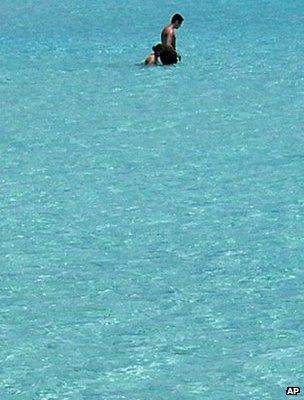EU bathing water continues to improve, says report
- Published

The latest data on EU bathing water quality has been released, showing 93% of sites meet the minimum standards.
However, the authors said storm-water run-off was still causing pollution problems in some areas.
Compiled by the European Environment Agency (EEA), the report lists data from more than 22,000 sites within the EU, Croatia and Switzerland.
An interactive website allows people to check the water quality of prospective holiday destinations.
The data, which refers to the 2012 bathing season, shows that 20,621 out of 22,184 (92.9%) bathing sites achieved at least the minimum water quality standard.
These figures show a slight improvement from 2011, when 20,499 sites out of 22,374 (91.6%) at least met the minimum standard.
The EEA report said that although the overall data matched the longer term trend of improving water quality, about 2% of the sites sampled did not meet the minimum criteria.
It added that the nations with the highest proportion of non-compliant locations were Belgium (12%), the Netherlands (7%) and the UK (6%).
Room for improvement
EEA executive director Prof Jacqueline McGlade said: "Today's report demonstrates that bathing water quality is generally very good, but there are still some sites with pollution problems, so we urge people to check the rating of their favourite swimming place."
EU Environment Commissioner Janez Potocnik said that it was encouraging to see the quality of bathing water improve.
However, he added: "More remains to be done to ensure all our waters are suitable for bathing and drinking and that our aquatic ecosystems are in good health.
"Water is a precious resource and we need to put into practice all the necessary measures to protect it in full."
In order to monitor the quality of a site's bathing water, samples are collected before the start of the holiday season and monthly during the summer (May-September).
Samples are sent to laboratories, which analyse levels of certain types of bacteria that could indicate the presence of pollution, primarily from sewerage or livestock waste.
- Published27 March 2013
- Published8 November 2011